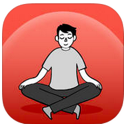
What Should I Expect?
Meditation isn’t always pleasant.
All sorts of things can come up when you practice mindful meditation, including thoughts, feelings, and physical sensations. All sorts of things that will try and “hook” your attention away from your practice.
Some of these hooks can be pleasant, like thinking about what you’re going to do this weekend. Some of them can be unpleasant, like how bored you feel or that your back hurts. When you’re new to meditation it can seem strange to focus on not thinking. Nothing. At all. In particular. And to remain open-minded and not judgmental when we do get hooked. The secret is when you notice you’ve been hooked, observe this (hmmm) without judgment (meh) and turn your attention back to something neutral, like your breath.
For best results, regularly practice mindful meditation in manageable doses, in quiet, calm environments.
The more you do it, the better you get. Just as lifting weights will make your body stronger, mindful meditation can make your brain stronger.
Meditation is a skill and it takes regular practice to maximize its benefits. If 20 minutes seems overwhelming, start with 3 minutes once a day.
You will notice added benefit with minimal effort if you are regularly practicing at different times of the day with different amounts of stressors. It’s all part of the rewiring process.
Like any good coping mechanism, meditation is less effective in more stressful situations. You might notice that a 20 minute session generally sets you up well for the day, but right before a test you might realize the relaxation effects wear off much more quickly. Don’t get discouraged if you notice this.
Experimenting with different types of meditation is important.
You may have tried meditation before and didn’t think it was for you. Not all meditations are the same! Give it another try!
You may find that active thinking meditation is more engaging and easier for you. You may more fully appreciate a resting meditation that has an active physical component, such as yoga. Some note having peaceful background noise can be helpful in not getting hooked as often.
Even if you’ve found something that is working, experimenting can give you more tools for your tool kit.
|
App |
Rating |
Pros |
Cons |
|
|
8.5 |
Free! Great for beginners, lots of meditations of different lengths to choose from. Very user friendly, has a great tutorial and you can track your progress easily. Has a self-meditation timer. |
Not all of meditations are free. More experienced practitioners might get bored. |
|
|
6 |
Free! This app focuses on several Mindfulness Techniques and target very specific things such as test or performance anxiety, dealing with conflict or worry. You can create a “favorites” list to store the things you like and get tips for other things you can do. |
There are A LOT of features. It will take patience and time to get everything set up and use. Their approach to some issues may be too basic for a medical student. |
|
|
7.5 |
Free! Lots of great preloaded mindful meditations of various lengths. Great variety of sessions for any skill level. You can also track your progress. User friendly. You can turn music on or off. |
While there are a lot of free meditations, they aren’t as specific as other apps (like for test anxiety or sleep). |
|
|
7 |
Free! Several preloaded meditations of various lengths. Great variety of sessions for any skill level. |
Not all meditation sessions are free; to get a good variety you’d have to pay for some and you need wifi to download them. |



